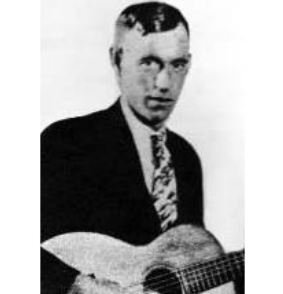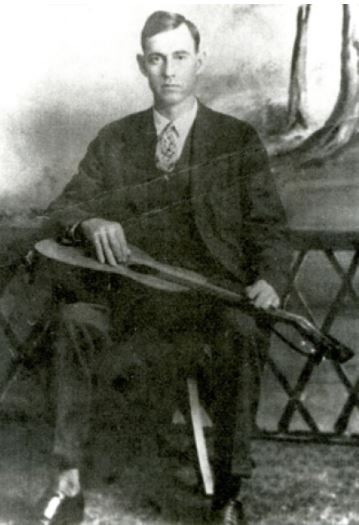Frank Hutchison
Frank Hutchison, described in Okeh Records promotional materials as “The Pride of West Virginia,” is thought to be the first non-African American musician to record in the country blues idiom. He was born in Raleigh County in 1897, but within two years his family moved to Logan County. He was exposed to Appalachian music at an early age because his grandfather, Eldredge Hutchison, was a fiddle and banjo player who played regularly in Logan both before and after the family moved there. Eldredge went to work in the mines after the move from Raleigh County, and he died a coal miner’s death in a slate-fall in 1903.
The loss of his grandfather’s music may have opened Frank to new sounds. When the railroad first came into Logan County in 1904, he was exposed to African American blues and pre-blues by Henry Vaughn, a black railroad worker who also played guitar. Later on, when Frank was working as a miner in the Fort Branch and Ethel coal camps along Dingess Run, he regularly visited with an older black musician named Bill Hunt who lived in the hills above the coal camps and played blues music at the company store on paydays. Sherman Lawson, the fiddler with whom Frank recorded several tunes, reported to folklorist and musician Mike Seeger that Frank spent a great deal of time with Hunt and learned many of his songs from him.
Frank Hutchison was acquainted with many other Logan County musicians, including the Williamson Brothers and Curry, Dick Justice, and Aunt Jenny Wilson. In 1984 Aunt Jenny told an interviewer about how Hutchison and Justice would go to local dances and “play half the night,” and about how Frank sang the old Scottish and English ballads like Barbara Allen, although he never recorded any of them.
Between 1926 and 1929 Hutchison recorded more than 30 sides in New York and St. Louis for the Okeh label. The material was an eclectic repertoire of blues, pre-blues and blues ballads; ragtime tunes; songs derived in part from the British ballad tradition; Appalachian fiddle tunes; and songs of his own composition including one called The Miner’s Blues. He accompanied himself on guitar on most of them, on harmonica on a few of them, and fellow Logan Countian Sherman Lawson accompanied him on fiddle on three issued and three unissued sides. After these records were made, he frequently performed on stage in Logan and in many of the surrounding coal camps.
In 1929, Hutchison recorded with artists including Emmett Miller, Fiddlin' John Carson, and Moonshine Kate for a three-disc album of music and comedy titled “The Okeh Medicine Show.” The records were meant to encourage sales of the performers’ 78 rpm records on which listeners could hear the full versions of the songs they experienced on “The Okeh Medicine Show.”
Hutchison’s rendition of “Stackalee,” a popular murder ballad of the late nineteenth and early twentieth centuries, was included in Harry Smith’s 1952 Anthology of American Folk Music, a six-LP compilation that jump-started the folk revival. (Dick Justice’s “Henry Lee” and “Gonna Die With My Hammer In My Hand” by the Williamson Brothers and Curry were also included in the Anthology. Thus three of the eighty-four tracks on this influential compilation came from Logan County.)
Hutchison’s legacy has been further secured by the fact that his songs have been covered by or have influenced a great many musicians, including Doc Watson, John Fahey, Bob Dylan, Mike Seeger, Roscoe Holcomb, Cowboy Copas, Frank Fairfield, Chris Smither, and Charlie Parr. He was inducted into the West Virginia Music Hall of fame in 2018.
After arriving with his family from Raleigh County, Hutchison lived in Logan at Mud Fork, and then in Fort Branch, Ethel, Big Creek, and Lake, before moving to Ohio sometime after 1940. He had worked as a coal miner for many years, and as a storekeeper and postmaster at Lake. He is buried in a hillside family cemetery in Lake.
—Gloria Goodwin Raheja, February 2021.

